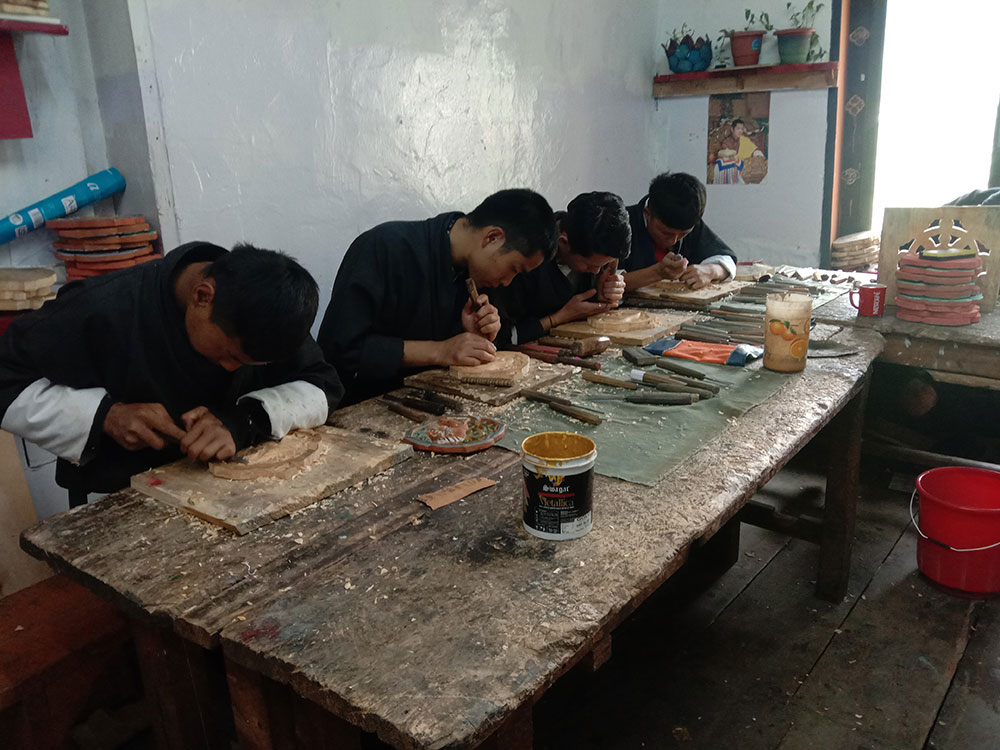Private art school provides home and second chance to life
KP Sharma
In a room filled with murals and intricate patterns of Chana Dorje, Leki Dorji, a painter, sits cross-legged on a wooden floor, his back straight and eyes focused on the image in front of him. It is Zorig Day, May 5.
Not long ago, Leki Dorji was tending to his small farm and cattle after he was forced to drop out of school. His mother fell terminally ill and his father had to accompany her to India for treatment. With no one to attend to farm work and the animals, Leki Dorji and his two siblings decided to remain at home and discontinue schooling. He was then in Class VII.
Leki Dorji developed an interest in traditional painting. But he could not pursue his passion as his academic qualification; a mere Class VI pass certificate barred him from getting enrolled in any institute.
However, a blessing came from a private art school offering Leki and many others like him a chance. It was a lifeline. Choki Traditional Art School, a private school at Kabisa, welcomed him and others with similar stories.
Leki Dorji said that he first heard about the institute through his cousin who insisted he joined the school to pursue his passion. He then headed to Thimphu for the interview with the little money he earned in his village. His hopes and dreams were once again rejuvenated when he was selected for lhadi (painting) in 2018.
Leki Dorji is not alone. Sangay Tshering Palden, a graduate of the school and now working as an embroidery instructor said that she could be an independent woman all because of the school’s support and help.
“I could not join other institutes as I could not continue my school after class eight.”
She added that since academic qualifications were a must for training in other institutes, CTAS gave her and youths alike with low or no qualifications a second chance in life.
Today, she supports her family with whatever she earns from her job offered by the school.
Wangyel Lhamo, a trainee in embroidery from Bumthang is planning to make it her source of livelihood. For now, she said weaves at home which earns a little money to support her family.
“I could not join other Zorig institutes as I didn’t meet the eligibility criteria,”, said another trainee student who is currently learning patra (wood carving).
There are 168 trainees in CTAS manned by about 18 staff members.

The executive director of the school, Dorji Wangmo, said that the school offers free learning opportunities to economically and socially disadvantaged children in the country.
The trainees, Dorji Wangmo said, come from diverse backgrounds with low academic qualifications. “Some were admitted to school while some didn’t get the opportunity,” she said.
Strict background checks are done at the time of recruitment. “Only youth from humble backgrounds are admitted to the school.”
The art school offers five programmes such as lhadi (painting), patra (wood carving), thazo (weaving), tshemdrup (embroidery) and tshemzo (tailoring) ranging from three to six years.
The school depends on well-wishers and international donors for financial support.
With the help of international supporters, the fundraising walk called Trans Bhutan Trail CTAS fund-raising challenge ended recently. “Meeting the rising operational cost as well as investment in infrastructure and human resources is a big challenge.”
Choki Traditional Art School was established in 1999 by Dasho Choki Dorji, the then head of the Painting Department, and responsible for starting the national institute of zorig chusum in the early 1970s.


